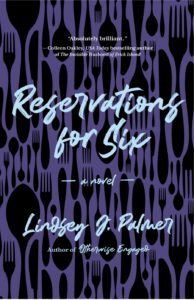The ritual of birthday dinners among old friends — the lengthy and indulgent courses, the observations of milestones met, missed, and anticipated — provides the structure of Eastham resident Lindsey J. Palmer’s fourth novel, Reservations for Six.
Palmer explores how “home” is defined through expectations, assumptions, and the promise of our earlier selves. And while the topics of her previous novels have ranged from staff shake-ups in a declining magazine industry to the perils of cohabitation and wedding planning, they all center on relationships.

“There are these ideas when you’re younger that whatever romantic partner you find will fulfill all of your dreams or needs — that’s what’s sold to people,” she says. “And some of the best advice I ever received was to look to different people for different things to fill you up. So, exploring modern friendship in adults has always been interesting to me.”
Reservations for Six alternates between the perspectives of married partners and friends who have navigated adulthood together through parenthood and divorce, marking each year by celebrating each of their birthdays at the same restaurant. Through these annual gatherings Palmer explores her characters as they compare their current lives.
Not all of them are happy to see these celebrations continue. For one character, “Birthday candles to match one’s age was for children, not a middle-aged man whose life was so monotonous that the appearance of a cake was meant to count as grand excitement.” Another takes the opposite view, particularly when it comes to blowing out those candles: “Sharing the wish aloud with your friends was like notarizing it, welcoming it to the world, so it could be nurtured and nourished.”
Palmer says that the idea of using birthday gatherings as a narrative device came to her at a family reunion with her in-laws. “At dinner, one of the couples announced they were getting a divorce,” she says. “Looking around the table, I thought about how the six of us would never be getting together like this again. The couple was very open, and I was struck by how normal their issues sounded. I thought how interesting it would be to explore the reverberations that this kind of discussion would have on a group.”
The real-life experience made its way into the novel. Nathan, a mathematics lecturer, upsets his own group’s equilibrium at one dinner by announcing his intention to divorce his wife Louisa, a school administrator. At first it feels natural for readers to cast Nathan as the villain of the piece, since he’s ending his marriage in favor of a questionable affair with a former student. But Palmer doesn’t allow us to assign sole blame to Nathan that easily: Louisa turns out to be frustrated by other demands of adulthood apart from her marriage, and both parties seem equally culpable in the breakdown of their relationship.

Choral storytelling — telling stories using multiple points of view — has always appealed to Palmer, she says, because she has trouble making choices. In Reservations for Six, she also drew on her own feelings and assigned them to her characters to “see how their differing views on motherhood play out in their lives and bounce off the other characters.”
The novel is compelling in its exploration of the pressure to become a parent. For some, the choice to forgo this role is an act of self-care: as one character says, “Taking care of myself is hard enough.”
Conversations in the novel explore the ways individuals cross or circumvent other milestones in life, which Palmer makes vivid by emphasizing each character’s self-awareness. “I don’t have these qualities of yours: patience, calm, attention to the minutest detail,” one woman tells another. “All that inspirational quote crap, which turns out to mean something.”
But perhaps the most compelling aspect of Palmer’s novel is how it continually pushes against notions of what it means to be “in the right” in a relationship. Through her characters, she perfectly captures the feelings of hollow victories and missed opportunities that result when people focus on score-settling instead of connection.
In exploring the ways relationships change and sometimes degenerate over time, Reservations for Six suggests that everyone can be blamed on some level when things go wrong — even when blame turns out not to be the point.
Reservations for Six
The event: Inside the Pages presents Lindsey J. Palmer and Nicola Kraus
The time: Tuesday, Aug. 23, 5 p.m.
The place: Wellfleet Preservation Hall, 335 Main St.
The cost: $15 general admission, $16 at the door



